(We apologise for the random styling that has occurred on this page which was unfortunately out our hands at the time)
Jan Czwojdrak
Former Polish Air Force 300 Squadron Technical Trainer
Jan Czwojdrak
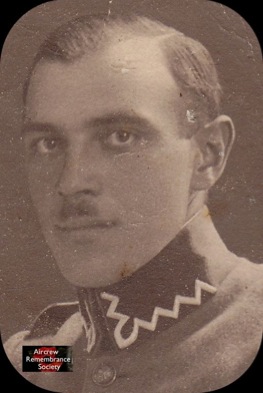 Jan Czwojdrak taken in 1926 (Courtesy Karol Kubiak)
Jan Czwojdrak taken in 1926 (Courtesy Karol Kubiak)
Czwojdrak was born on 9 December 1897 in Dlugoleka near Krotoszyn. He was one of thirteen children of Piotr and Antonina, maiden name Matuszewska. Jan Czwojdrak graduated in seven classes of Elementary School in Kobylin, near Krotoszyn. During the First Word War he was a sapper in the German Army. Before the end of the war he became a Wielkopolska Insurrection member, and fought in South Wielkopolska. He was known as an intense enemy of Germans and the reason why Jan Czwojdrak was wanted by the Gestapo during the Second Word War 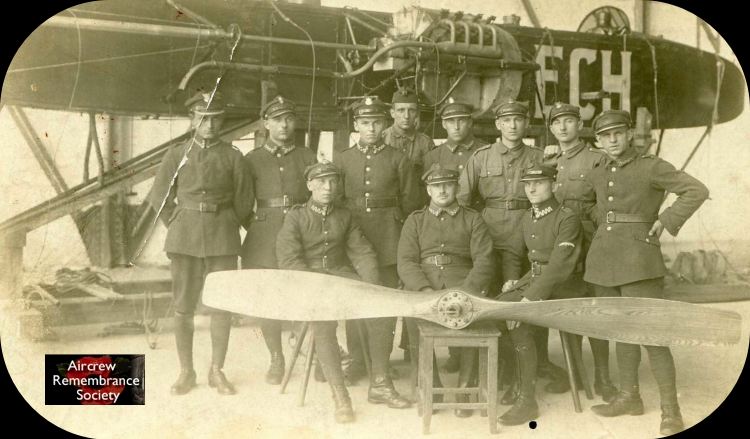 Polish dirigible "Lech" with crew, top row fourth from right Jan Czwojdrak, bottom row first from right Jan Szczuraszek, Torun 1923?
Drigible "Lech" was a first in polish army.(Courtesy Karol Kubiak)
Polish dirigible "Lech" with crew, top row fourth from right Jan Czwojdrak, bottom row first from right Jan Szczuraszek, Torun 1923?
Drigible "Lech" was a first in polish army.(Courtesy Karol Kubiak)
After the start of the Polish – Russian war he spent 18 months in the front line in 1 Balloons Battalion. In 1919 he officially joined the Polish Army in the 12th Regiment of Wielkopolska’s Gunners in Ostrow Wielkopolski. Between March and August 1920 Jan Czwojdrak was a student at the School for Non-commissioned Officers of the 1st Aeronautics Regiment in Poznan. Afterwards between December 1920 and June 1921 he was in the Professional Non-commissioned School for Infantry in Chelmno. On 11 November 1921 he married Stanislawa Kropinska in Labiszyn, near Bydgoszcz.
On 30 April 1922 he was appointed as Professional Non-commissioned Officer in 1st Balloons Battalion in Torun, where from May 1922 to March 1938 he held the position of Administrative Non-commissioned Officer. In the meantime, Jan Czwojdrak was awarded instructor in Maintenance Department, served the only one in Poland dirigible “Lech”. On this airship Jan Czwojdrak made several flights. During service at Torun in 1920 the Russian delegation visited the town. The Russian soldiers were surprised that the light in the room was turned off with a switch and not lit with a candle.
On 1 October 1923 Jan Czwojdrak was promoted to Sergeant. In November 1928 he was transferred to Warszawa for training in meteorology at the Meteorology Centre and graduated in April 1929. After that he moved in March 1938 to Bydgoszcz, to the School for Non-commissioned Officers of Aviation for Teenagers, where he attained the position of Administrative Non-commissioned Officer. Simultaneously he was a member of the same school in Krosno where he was 3 Squadron Leader in control of aircraft.
After Germany’s attack on Poland in September 1939 he was evacuated from Krosno with 250 students and Ground Crew. He travelled through Rudniki, Bilgoraj, Zwierzyniec, Uscilog, Kiwierce, Jezierna, Zalucz, Sniatyn and Karlowo and reached the Romanian boarder on 16th September. At about 2 o’clock the following afternoon Jan Czwojdrak and his students crossed the boarder, but was captured by Russian soldiers and transferred to a prison in Czortkow near Tarnopol. The prison cell was just 2.5 x 3.7m and held 46 prisoners. As a Non-commissioned Officer he avoided officers from Krosno, who were shot at Katyn. Jan Czwojdrak was acknowledged as a spy and moved to a concentration camp on Siberia’s Kola Peninsula. The conditions in camp were very tough. The prisoners had to work 14 hours each day. At the beginning every twelfth day was free and from 1940 every second Sunday. The typical food consisted of crushed oats and stale fish. 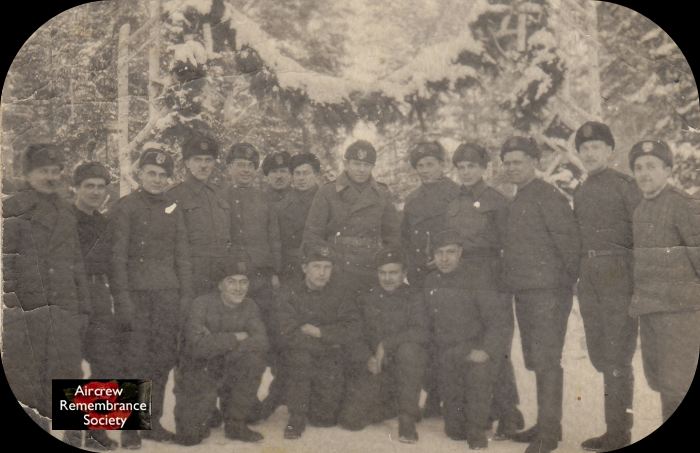 Jan Czwojdrak back row fourth from left during his stay in Koltubanka (Russia) 1941. (Courtesy Karol Kubiak)
Jan Czwojdrak back row fourth from left during his stay in Koltubanka (Russia) 1941. (Courtesy Karol Kubiak)
Based on the Sikorski – Majski agreement Jan Czwojdrak left the concentration camp and reached Koltubanka on 2 November 1941, where the Polish Navy and Air Force were created. In Koltubanka he was a squadron leader. He helped soldiers without experience of the Air Force to join this group with training and described the buildings, airports and courses in Krosno. This training was useful during interrogation by NKVD,who questioned Polish soldiers about their experiences in Poland.
The weather was the same as in the north of Russia and soldiers slept in tents excavated in the snow. During the night they had to be careful not to touch the tent with their heads, because their hair would freeze to the canvas and had to be cut away with a knife. Due to the lack of equipment soldiers made Polish badges from tin cans and fixed them to their caps.
Airman left Koltubanka by train on 31 January 1942 when the temperature was -40ºC. On the 26 April 1942 Jan Czwojdrak reached the Spares Centre of the Polish Army in the Middle East and on 6 May1942 was moved to the Communications Squadron. During a medical examination on 15 June 1942 he received health category C due to his age and poor conditions he experienced in the concentration camp. At the same time Jan Czwojdrak was confirmed as a Sergeant and arrived in England on 24 November 1942.
In England he was a Manager of the Polish Air Force Spares Centre in Blackpool. 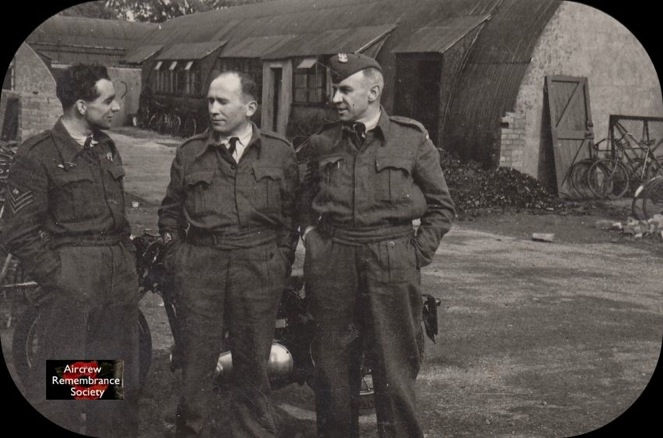 Jan Czwojdrak on right taken at Faldingworth, England. (Courtesy Karol Kubiak)
Jan Czwojdrak on right taken at Faldingworth, England. (Courtesy Karol Kubiak)
On 5 September 1944 Jan Czwojdrak was posted to 300 (Polish) Bomber Squadron, based at Faldingworth airfield, Lincolnshire, as Leader of Discipline of the squadron’s Technical Wing. This move was due to a gradual changeover from English to Polish personnel. During this time 300 Squadron was equipped with Avro Lancaster heavy bombers. Jan Czwojdrak recalled that during taxiing and take-off of Lancaster's on bombing raids the level of vibration was so high that the Ground Crew had to hold their stomachs. He won approval and was nominated on 1 March 1945 to Flight Sergeant, and awarded the Flight Medal on 25 July 1945.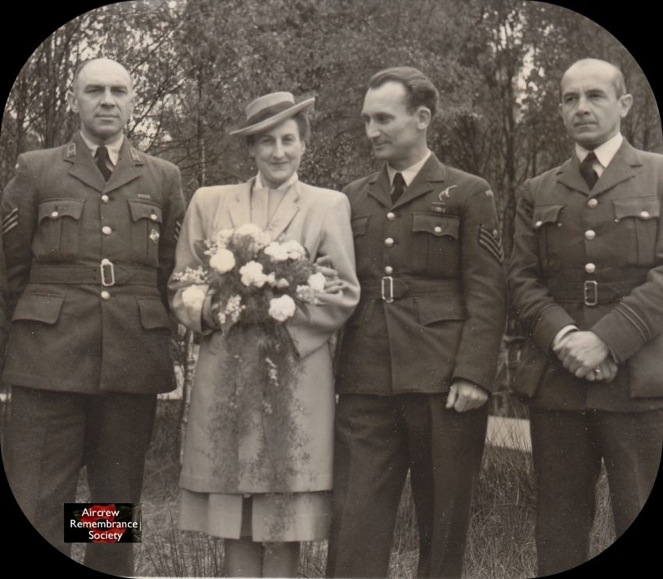 Wedding day (Courtesy Karol Kubiak)
Wedding day (Courtesy Karol Kubiak)
After the war Jan Czwojdrak contacted his family in Poland and decided to return to his homeland. On 10 September 1946 he was demobilised from the Polish Air Force and travelled to Gdynia by boat. He returned to his wife and two daughters Regina and Helena and lived in Torun. As a retired soldier from England Jan Czwojdrak was harassed by Security Officers and could not find a job. During this period he was often interrogated and those events additionally weakened his health, already damaged during work in the concentration camp in Russia’s Kola Peninsula. Sometimes agents observed Jan Czwojdrak in the street looking through small holes in their newspapers. Often agents walked down the street close to Jan Czwojdrak’s home on Klonowica Street.
Finally he got a job in the Finance Department in Torun’s Automotive Shop. After that he worked in Torun’s Land Improvement Office as a white-collar worker. Before retirement he got a job in the Maintenance Office in Solec Kujawski near Torun. Jan Czwojdrak died on 21 January 1969 and was buried in Torun’s cemetery on Galczynskiego Street.
Article especially prepared for the Aircrew Remembrance Society by Karol Kubiak
Sources:
- autobiography, written by Jan Czwojdrak in 1968, for Senior of Aviation’s Club
- Regina Kubiak’s daughter of Jan Czwojdrak
- documents from Sikorski’s lnstitute, London
- documents from MOD
- documents from Polish Air Force Assocation, London
- verification of translation by Rodney Byles
